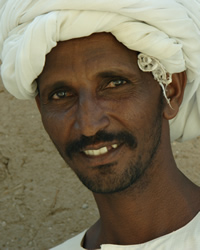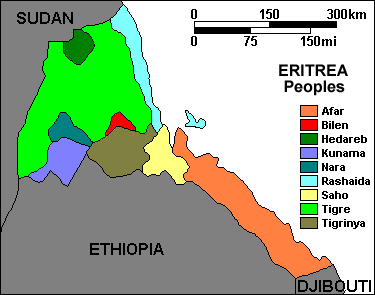Sudan obtained its independence from Britain and Egypt in 1956. Unfortunately, since that time Sudan has experienced a series of civil wars, revolutions, ethnic cleansings, genocides, droughts, famines, and wars with surrounding African countries. As a result, many Sudanese Arabs have left their homeland in search of a better life. Starting in the eighth century over a period of one thousand years, the inhabitants of northern and central Sudan gradually became Muslims. This Arabization of the population took place by military conquest and trade. The various ethno-linguistic groups of Sudan adopted Arabic as their first language and converted to Islam. These peoples make up the Sudanese Arabs of today.
To escape the violence and economic disruptions in their land some Sudanese Arabs moved to Ethiopia and Eritrea. After a three decades fighting, Eritrea gained its independence from Ethiopia in 1993. Since November 2020 the Tigray people of Ethiopia have been fighting an insurrection against the Ethiopian government. The Eritrean regime has supported the Ethiopians knowing that if the Ethiopian Tigray people win independence that the Eritrean Tigray will follow. It is easy for the Sudanese Arabs to be caught in the middle of such conflicts.
Eritrea lies along the Red Sea coast of Northeast Africa. It is a multi-ethnic nation with nine recognized people groups. Even though Eritrean has a majority Christian population, Muslims are permitted to practice their faith. Most Eritreans are involved in agriculture. They grow barley, wheat, peanuts, fruit, and vegetables. Animals such as cattle, sheep, goats, and camels are raised for their milk, hides and meat. Fishing on the Red Sea also provides income. Most Sudanese Arabs in Eritrea fall into the lower middle class. They own shops, work in trade and mining. Eritrea has gold, silver, copper, zinc and potash deposits.
The Sudanese Arabs speak their own dialect of Sudanese Arabic at home. Eritrean has nine national languages including Arabic and English. Italian is still spoken by some older people as Eritrean was an Italian colony until WW2. English in used in universities and in technical fields. The man is the head of the home in Sudanese families. Children, especially boys, are seen as blessing from Allah. Traditionally, Sudanese women stayed home to take care of children while the husband worked. This is changing as more Sudanese women gain more education.
Almost all Sudanese Arabs are Muslims, most being Sunni, the largest brand of Islam. Their Islam is often mixed with folk religion and animism. Sunnis try to obey the teachings of the Koran and the prophet Mohammad. Sunnis believe that by following the Five Pillars of Islam that they will attain heaven when they die. However, Allah, the supreme God of the universe, determines who enters paradise. Sunnis pray five times a day facing Mecca. They fast the month of Ramadan. They attend mosque services on Friday. If a Muslim has the means, he or she will make a pilgrimage to Mecca once in his or her lifetime. Muslims are also prohibited from drinking alcohol, eating pork, gambling, stealing, using deceit, slandering, and making idols. A Muslim man may have up to four wives.
The two main holidays for Sunni Muslims are Eid al Fitr, the breaking of the monthly fast and Eid al Adha, the celebration of Abraham's willingness to sacrifice his son to Allah.
All Eritreans need a just and lasting peace from the Tigray rebellion. Most Sudanese Arabs have never heard a clear presentation of the good news about Isa or Jesus. Jesus is vastly more than the human prophet! Rural Sudanese in Eritrea would benefit from teams of believers bringing modern medicine and improved agricultural methods.
Pray for a lasting peace in Ethiopia, Sudan and Eritrea. Pray that the tiny group of Sudanese Arab believers would be encouraged and strengthened in the faith. Pray that Sudanese parents would be able to meet the needs of their children. Pray that Sudanese Arabs would tune into Christian TV and radio broadcasts. Pray for a Disciple Making Movement among the Sudanese Arabs in Eritrean in this decade.
Scripture Prayers for the Arab, Sudanese in Eritrea.
| Profile Source: Joshua Project |













